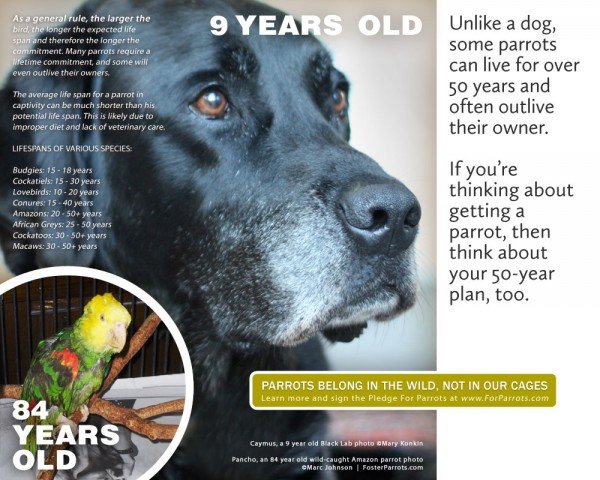Unless you are familiar with parrots, it often comes as a great surprise to find out how long-lived they are. People familiar with animals such as dogs and cats know that a 15 year old dog is something to talk about; but what about an 84 year old parrot? Holy longevity, Batman!*
When a person starts to investigate whether or not to bring a parrot into their home, knowing where they themselves are in their life is important. These animals can live as long as we do, and thus they will be around for many of our life events: marriage, divorce, children, moving, job changes, schooling… and all these events can lead to a parrot losing his home. We must be honest with ourselves when we begin our research about where we are in our lives, where we want to be, and whether a parrot is the right companion for our journey.

Poncho is estimated to be 84 years old.
Once you live with parrots, knowing how to keep them healthy and happy for their entire life is paramount. In addition to plenty of attention and foraging time, a healthy diet is needed for a happy bird. You may even discover that providing a parrot with the correct diet is a plus for you, too: properly feeding them involves using fresh fruits, vegetables, grains and pellets. Many people say that their parrots eat better than they do! I’m sure the parrots will share, though: they want you around a long time, too…although, as yummy as pellets smell, I’ll admit that parrots can keep those!
So: want to keep your parrot around well into your and Polly’s Golden Age? Keep him healthy and happy!
- Health: Dr. Scott Echols, a board certified avian veterinary specialist, has provided some great, comprehensive information on avian diets here, including the form Food for Different Avian Species. For the most up-to-date information on avian nutrition, join Dr. Echols in the Nutrition For Pets facebook group here. He’ll even answer individual questions, as long as they relate to nutrition!
- Happiness: For excellent parrot foraging information and easy make-your-own parrot toys, make sure to check out Kris Porter’s fantastic site, Parrot Enrichment. It’s chockfull of great ideas on toys, foraging, training, nutrition and more.
To finish, here’s another example of a long-lived parrot. Please meet Cookie, a Major Mitchell’s cockatoo, as he celebrates his 78th birthday:
Cookie is the only animal at Brookfield Zoo that is from the original collection, dating back to the zoo’s opening in 1934. Because of his advanced age and several medical maladies, including osteoarthritis and osteoporosis, Cookie has been permanently off exhibit since September 2009. His keepers give him a lot of attention and provide him with a variety of enrichment items to occupy his time and stimulate his mind.
*Despite this historic longevity, in recent years a trend has been noticed of (captive) parrots dying much sooner than they should. It is hypothesized that this is likely due to improper diet and lack of veterinary care. Even Alex, perhaps the most widely known parrot, died at 31 years of age: 10 -20 years earlier than his species should live (Congo African Grey Parrot).
Average lifespans for different parrot species:
Budgies: 15 – 18 years
Cockatiels: 15 – 30 years
Lovebirds: 10 – 20 years
Conures: 15 – 40 years
Amazons: 20 – 50+ years
African Greys: 25 – 50 years
Cockatoos: 30 – 50+ years
Macaws: 30 – 50+ years
Further information about parrot lifespans:
- Survival on the ark: life-history trends in captive parrots (scientific paper)
- The lifespan of some common pet birds
- Longevity in captivity
- Parrots’ average lifespans
- Diet influences lifespan in parrots (scientific paper, PDF)







Comments are closed.